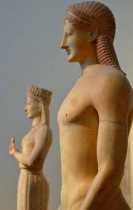
Three things stand out in my memory from my trip to the ancient city of Ephesus, City of the Moon.
The first, quite frankly, was the public toilet. Astoundingly, the row of side-by-side toilet seats—the ancestors were social people—looked exactly—exactly—like modern toilet seats.
But these were hand-carved from marble. Wow.
The second was the civic amphitheater. Here Saul of Tarsus—later known as “saint” Paul—was nearly lynched by an angry mob for blaspheming the city's patron goddess, the famously many-breasted Artemis (Diana) of Ephesus. Megálê hê Ártemis tôn Efesíôn! they chanted: Great is Artemis of the Ephesians!
According to the New Testament book of Acts, the mob was led by a guild of souvenir-manufacturers, cynically worried about loss of revenue. (Why do non-pagans find it so difficult to believe that we, too, might love our gods?) Unfortunately, in the end a conscientious city official intervened to save “Paul's” life.
During my visit to the theater, I had the pleasure of standing in the middle of the stage and chanting, in modern pronunciation, the chant of the ancients: Megháli i Ártemis tôn Efesíôn!
Indeed, as reputed, the acoustics were wonderful.
My third memory from the day is much more humble, but—in many ways—the most telling of all.





















